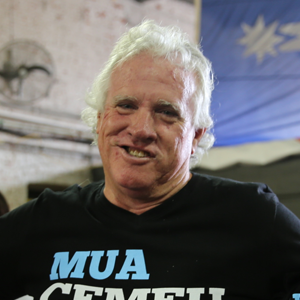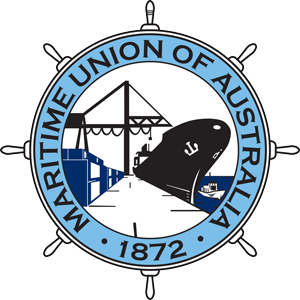
Padraig (Paddy) Crumlin was born and raised in Riverwood in Sydney. His father, Joe, was a self-funded Master Mariner, who went to sea as a deck boy on the Australian coast in 1947; Joe was also an active trade unionist who was on the Executive Board of the Merchant Service Guild (MSG). Paddy attended De La Salle College Kingsgrove and DeLa Salle Bankstown on a Commonwealth scholarship.
In his youth, Paddy was an active sportsperson in rugby league and athletics but a promising football career ended when he broke his femur in a football match. He first went to sea in the Australian Merchant Navy in 1977, at the urging of Joe, who wanted Paddy to stop making surfboards, a job that was also a passion of Paddy’s that took him to surfing venues all around the world.
During Paddy’s many years on ships, he worked as a deckhand, pump man, greaser, Able Bodied Seaman (AB) and Bosun in the dredging, hydrocarbon, bulk ore, tanker and container and general cargo trades.
Paddy represented the Seaman’s Union at the first integrated rating retraining course for all Australian ratings and was issued the first Integrated rating certificate, Number 0001, in recognition of his contribution to the success of the course.
He has been a full-time union official since 1988. He was elected Sydney Branch and NSW Branch Secretary of the Seamen's Union of Australia. In 1991, he was elected as Deputy National Secretary of the Seamen's Union of Australia and, subsequently, when the SUA amalgamated with the Waterside Workers Federation in 1993, he was elected as Joint Deputy National Secretary.
He was elected to the position of National Secretary of the Maritime Union of Australia in 2000 upon the retirement of his predecessor, John Coombs. He is the fourth longest-serving leader of Australian maritime workers in modern times (E.V. Elliot served the SUA from 1941-1978; Jim Healy (WWF), 1937 – 1961; Charlie Fitzgibbon (SUA), 1961-1984; Tas Bull (WWF), 1984-1992; Pat Geraghty (SUA), 1978-1993 and John Coombs (MUA, 1993-2002).
Paddy has wide involvement in the port authority, towage, shipping, hydrocarbon, diving, cruise ship and stevedoring industries in Australia and internationally. He was a member of the Shipping Industry Advisory Group from 2009-2013 in the lead up to the Navigation Act reforms and ratification by Australia of the Maritime Labour Convention in 2011. He served as a director of the Sydney Ports Corporation during the time of the Patrick dispute in 1998.
He also keeps a watchful eye on the retirement funds of MUA members as Chairman of the Maritime Super Pty Limited, and, in his capacity as National Secretary, ensures the proper stewardship of membership funds deposited in the Maritime, Mining & Power Credit Union, where he has served as a director in past years.
He is also a Member of the Executive Board of the Australian Council of Trade Unions (ACTU), which gives him an influential voice on the policy and direction of the Australia labour movement. Working with his colleagues in the ACTU, he established, principally initially with the Australian Workers Union, the industrially and politically important alliance in the hydrocarbon industry. He also established, with the Transport Workers Union (TWU) and the Rail, Tram and Bus Union (RBTU), the Australian Transport Unions Federation, which seeks to unite the power of all transport workers in Australia.
Paddy has been a long-time international labour leader, in the maritime industry and beyond. Upon his election as MUA National Secretary, he was elected the first Australian to chair the Asia Pacific region of the 4.5-million member International Transport Workers Federation. In August 2006, Paddy was elected as the ITF’s Chair of the Dockers Section, which put him in a position to negotiate with global CEOs on behalf of dockers working on every continent. He was the first Australian to hold the post since former WWF General Secretary Charlie Fitzgibbon’s service in the position (1974-1983).
Paddy was, then, elected President of the ITF in August 2010 in Mexico City, a post he continues to hold after his re-election for a new term at the 2014 ITF Congress in Sofia, Bulgaria. He is the first Australian to lead the ITF as its president.
In addition to his global work with the ITF, Paddy has also represented international seafarers at the International Labor Organisation on maritime conventions for over 15 years in a senior capacity. In that period, Paddy played a central role in bringing about the introduction, and ratification in 2006, of the Maritime Labour Convention, which is widely know as the “seafarers’ bill of rights” because it establishes minimum working and living standards for all seafarers on ships across the globe.
He played a key role in establishing the International Bargaining Forum (IBF), which brings together every two years the ITF and the international maritime employers that make up the Joint Negotiating Group (JNG), with the end result being a framework agreement that ITF-affiliated unions advance in local negotiations with companies in their own country.
Paddy’s international vision encompasses a large view of international solidarity. He represented the Australian Council of Trade Unions (ACTU) in the first high-level delegation of the International Trade Union Confederation to China in 2010. He led a high-level delegation to Cuba in July 2012 to establish links forged 80 years prior; he was accompanied by his close international colleague, ITF management committee member Bob Crow, the General Secretary of the UK National Union of Rail, Maritime and Transport Workers who passed away in March 2014. Paddy and Crow met with leaders of the Sindicato Nacional de Trabajadores del Transporte y Puertos (SNTTP), which has over 180,000 members in all branches of transport.
Paddy has also shown his great passion for the rights of all Australians by playing central roles in the political, social and cultural life of the country. He is a member of the People with Disabilities and Carer Council, owing to his extensive professional involvement in catastrophic physical injuries of an industrial nature, both in Australia and internationally, as well as close personal experience working with family members with severe disability. He is also chair of Hunterlink, an Australian and international maritime worker industry counseling and early intervention service.
He has shown a long-standing commitment to the advancement of maritime culture and the arts in general, believing that the MUA should encourage artists and filmmakers to break new ground in challenging the perceptions we hold about the society in which we live. In particular, Paddy is a judge for the annual Blake Prize for Human Justice, which is sponsored by the MUA and is bestowed on a work of art that features a human justice theme.
He and his wife Gail have three children, Sol, Shea and Rory, and three grandchildren.
“I love my union, it's like a family," he has said publicly. "Unions are not about individuals, they are about families, working men and women with limited resources. Their fundamental resource is their capacity to come together in their own collective interest. Sometimes it can be dysfunctional, even more than The Simpsons. But family commitments last for a lifetime. Part of the stress of modern life comes from a sense of dislocation. Being in the MUA gives me a sense of location and stability in my own emotional life.”

